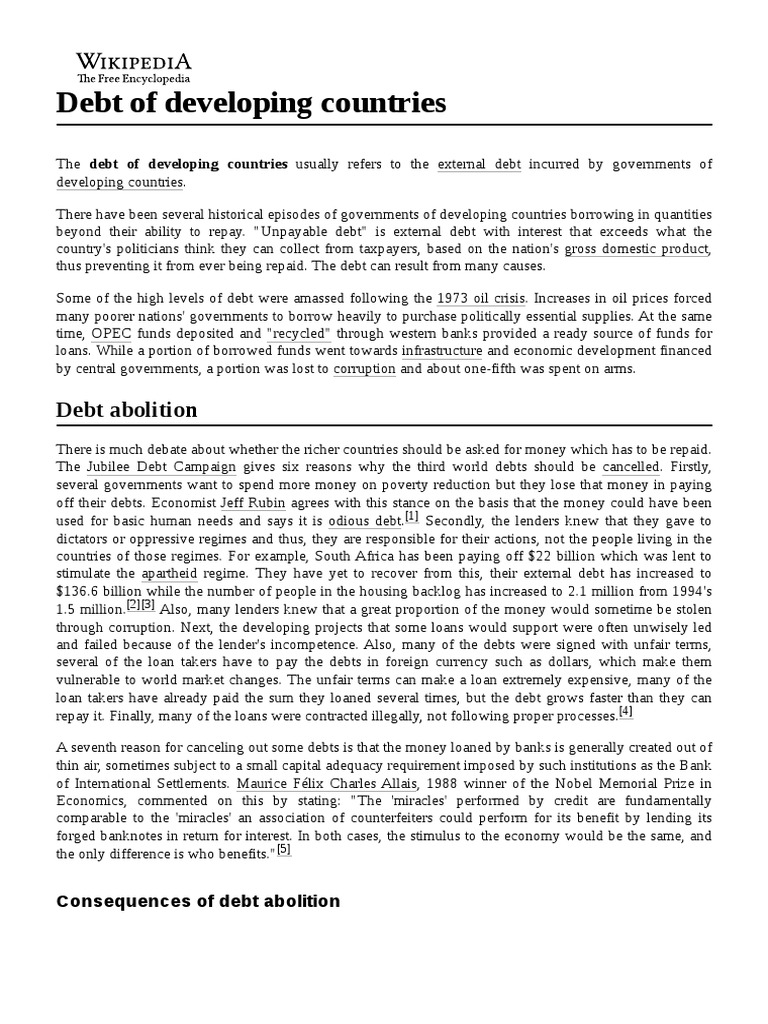Debt is a pervasive issue that afflicts many nations across the globe. However, the question remains: are there countries that operate without the burden of national debt? In exploring this topic from a Christian perspective, it is essential to consider the theological, economic, and ethical implications of national debt and the potential for debt-free nations.
To begin our inquiry, it is crucial to define what we mean by “national debt.” National debt refers to the total amount of money that a government owes to creditors, often resulting from borrowing funds to cover budget deficits. In contemporary economics, almost every nation is entangled in some form of debt. This borrowing can arise from various sources such as issuing government bonds, loans from international organizations, and bilateral agreements with other nations.
Notably, a handful of countries possess remarkably low or no national debt at all. Countries like Brunei, which relies on its extensive oil reserves, have managed to maintain a surplus while remaining debt-free. Similarly, countries like Palau, and Macao have also posted negligible debt levels, often due to their small economies and substantial financial reserves, derived from tourism or sovereign wealth funds.
One cannot overlook the importance of examining the underlying factors that contribute to a debt-free economy. In the instances of these countries, natural resources play a pivotal role. The abundance of oil, minerals, or fertile land has provided a financial foundation that allows them to operate without resorting to borrowing. Furthermore, effective governance and prudent fiscal policies are essential. These nations often demonstrate a commitment to responsible spending and saving, upholding the principles of stewardship found in Biblical teachings.
The Christian perspective on debt adds another layer of understanding. The Bible speaks significantly about money, lending, and the moral obligations involved in financial dealings. Proverbs 22:7 states, “The borrower is slave to the lender,” highlighting the potential loss of autonomy that accompanies debt. This scripture serves to remind us that reliance on debt can lead to adverse ramifications for a nation, including diminished sovereignty and an increased burden on its citizens.
It is also pertinent to explore the ethical implications of national debt from a Christian viewpoint. High levels of debt can lead to austerity measures that disproportionately affect vulnerable populations. When governments seek to cut costs to manage their debt, social services, education, and healthcare may suffer, leaving the poor and marginalized individuals to bear the brunt of economic hardships. This raises questions about a nation’s responsibility to care for its citizens, as dictated by the Christian doctrine of love and compassion.
Beyond the immediate ethical concerns, there is a theological dimension to consider. Nations that find themselves in perpetual debt may grapple with issues of faith and trust. Many in these societies might question divine providence amid economic hardship. Adherents to Christian faith are called to balance their actions with scriptural values, fostering an environment of hope and encouragement that does not solely depend on economic metrics. This contemplative struggle of faith versus fiscal pressure may enhance the spiritual resilience of those within these nations.
It is equally essential to recognize the complexities surrounding national economies. Even countries with low or no debt can face challenges that provoke a reevaluation of their fiscal policies. The global economy is inextricably interconnected; thus, events in one nation can induce ripple effects across others. Economic fragility, environmental crises, or geopolitical tensions can threaten even the most stable economies. Consequently, cultivating a debt-free status is a continuous process necessitating vigilance and adaptability.
Beyond merely identifying countries with minimal or nonexistent debt, we must also ask how these models can inform other nations grappling with overwhelming liabilities. Lessons learned from debt-free countries could inspire more extensive reforms. Robust policies aimed at diversifying economic foundations, promoting education, and investing in sustainable development are imperative in fostering resilience against economic downturns.
In conclusion, while very few countries exist without debt, examining the economies with prosperous, debt-free statuses can provide valuable insights into the principles of effective governance, stewardship, and ethical financial practices. From a Christian perspective, it is evident that the interplay of faith, fiscal responsibility, and moral obligation offers a comprehensive framework for understanding the complexities inherent in national debt. As nations navigate these turbulent waters, it is crucial that they remain committed to serving their citizens and upholding values of justice and compassion. Ultimately, striving for economic stability rooted in ethical stewardship may pave the way for a flourishing society that reflects the expansive love and mercy present in Christianity.



